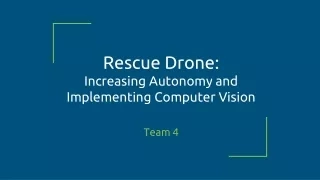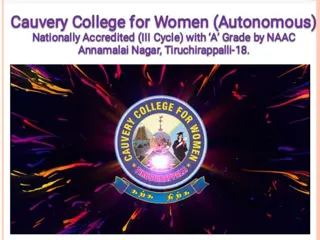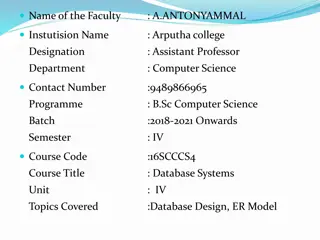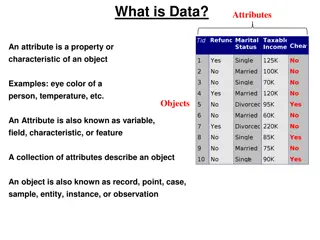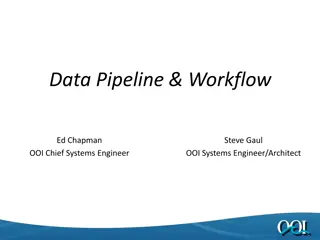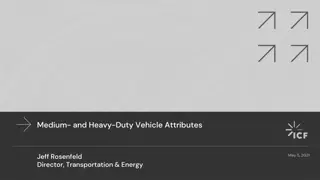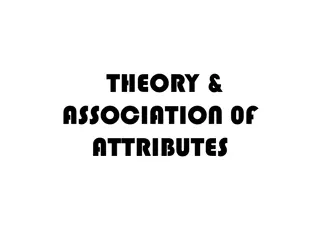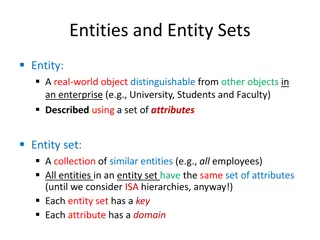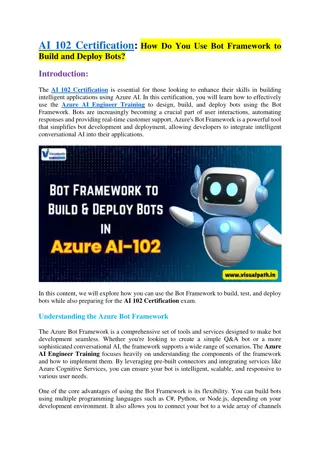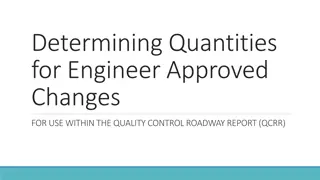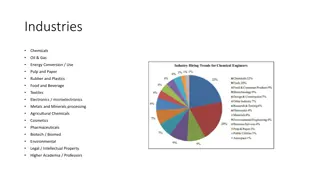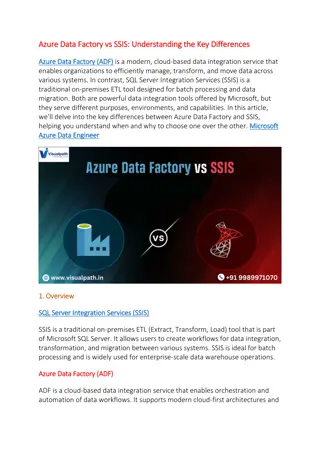
Attributes of a Successful Engineer
The attributes of a successful engineer encompass both technical knowledge and soft skills. Teamwork, leadership, communication, professionalism, and a positive attitude are key qualities. CEOs would emphasize these traits for success in engineering roles.
Uploaded on | 2 Views
Download Presentation

Please find below an Image/Link to download the presentation.
The content on the website is provided AS IS for your information and personal use only. It may not be sold, licensed, or shared on other websites without obtaining consent from the author. If you encounter any issues during the download, it is possible that the publisher has removed the file from their server.
You are allowed to download the files provided on this website for personal or commercial use, subject to the condition that they are used lawfully. All files are the property of their respective owners.
The content on the website is provided AS IS for your information and personal use only. It may not be sold, licensed, or shared on other websites without obtaining consent from the author.
E N D
Presentation Transcript
Scenario: Anthony worked in an engineering firm before he started at SJSU and knows a bit about design and construction. In his efforts to ensure a good project he appoints himself as team leader and tells all the others what to do. What do you think will happen? A. The team will build the best turbine structure in the lab B. Team members will appreciate Anthony taking charge C. Team members will resent his controlling attitude D. Anthony will end up doing all of the work himself E. C&D
Engineering Success & Teamwork ENGR 10 Introduction to Engineering
What makes a Successful Engineer? Amongst yourselves, answer these two questions: What are the attributes of a successful engineer? If you asked a company CEO the same question, what would he or she say?
How do I become a successful engineer? 1. Master technical knowledge 2. Develop soft skills --- communication, teamwork, leadership, social skills, interpersonal skills, professionalism, sense of responsibility, dependability, maturity, confidence, positive attitude ..
Technical Knowledge vs Soft Skills Which one is more important if you want to be viewed as successful ? Especially, if you want to grow (have more impact, more responsibility). Soft Skills!!!
What People Say About Teamwork Coming together is a beginning. Keeping together is progress Working together is success. Henry Ford Teamwork is the ability to work together toward a common vision. The ability to direct individual accomplishments toward organizational objectives. It is the fuel that allows common people to attain uncommon results. Andrew Carnegie Getting good players is easy. Gettin' 'em to play together is the hard part. Casey Stengel (former NY Yankees manager)
What is teamwork. Is a group that has: A common purpose and clear goals Complimentary skills A common approach to work The willingness to share information Member-supporting environment The ability to work through conflicts The willingness to take responsibility for team actions. maketeamworkhappen.com
Why Teamwork? 1. Accomplish more in: Quantity Complexity 2. Generate more solutions/brainstorming ideas. 3. Gain exposure to various points of view. 4. Develop/use critical thinking & evaluation skills. 5. Improve conflict resolution skills 6. Improve communication skills
Benefits Accomplish projects an individual cannot do Most engineering projects are too large or too complex for one individual to complete alone. Imagine trying to build the Golden Gate Bridge all by yourself! Brainstorm More Solution Options Different people looking at the same problem will find different solutions. A team looking at different proposed solutions may find pitfalls that an individual might miss. Detect Flaws in Solutions Members of effective teams can form personal bonds which are good for individual and workplace morale. In the university setting, students on teams often form bonds that extend beyond the classroom. Build Community
Benefits (cont) You learn different ways of approaching a problem when you are exposed to methods and ideas that other people have. Exposure to different points of view You must use these skills to evaluate the complex issues of team project goals and to formulate appropriate solutions and plans. Critical Thinking & Evaluation Skills
Benefits (cont) Yes, teams have conflicts, but you can develop the skills to facilitate solutions to conflicts so that the team remains functional. Conflict Resolution Skills Some students may accomplish more in order to keep up with the rest of the team. Increased academic work
Benefits (cont) Communication Skills Effective teams . . . Actively and effectively listen to their team members to understand their ideas and concerns. Effectively articulate their ideas or their concerns to others. Provide genuinely constructive feedback to team members
Teamwork Also Enhances Learning Teamwork provides the opportunity for collaborative learning. Teamwork keeps members motivated. People (students, engineering colleagues) are the best motivators of other people. Teaching others is the deepest form of learning. Teamwork helps speed up the solution process. IT IS how engineering professionals work and learn.
Organizing a Successful Team Define a common goal for the project. List tasks to be completed. Assign responsibility for all tasks. Develop a timeline. Develop and post a checklist. Maintain a central archive for all communications. (Drawings, Photos, Report, Presentation) Send reminders when deadlines approach. Send confirmation when tasks are completed. Communicate all team meetings.
Running Effective Meetings Plan the meeting objectives & agenda Inform the team when, where, information they need, what they need to prepare Conduct effectively follow agenda, one item at a time, manage discussion, maintain focus and pace Summarize meeting summarize decisions and action items, send notes out to team
Has teamwork worked for you? Talk about: one thing your lab team has done that has been particularly effective. Turn to your neighbors and discuss this
Team Skills for Members Listen to other's ideas. When people are allowed to freely express their ideas, these initial ideas produce other ideas. Listen Question Ask questions, interact, and discuss the objectives of the team. Persuade Individuals are encouraged to exchange, defend, and then to ultimately rethink their ideas. Respect Treat others with respect and support their ideas. Help Help one's coworkers, which is the general theme of teamwork. Share Share with the team to create an environment of teamwork. Participate All members of the team are encouraged to participate in the team.
Team Dynamics - Communication Listen Share Ideas Feedback Compliment each other's ideas Evaluate - Do not criticize Critique the idea, not the person Respond, don't react PARTICIPATE! Listen actively Don't interrupt Be patient and courteous Ask questions Don't express opinion as fact Explain your reasons Be aware of tone & body language Restate an idea to be sure it is understood Use appropriate humor
Team Dynamics Full Participation All team members contribute their time and energy to the project. More importantly, all team members participate in the decision making process. Having a dominant leader may work for the very short term, but will eventually lead to morale problems.
Team Dynamics Trust Members trust that each member will add value to the project Members work to ensure that everybody does contribute and that appreciation is expressed for different contributions.
What do I expect to get out of E10 teamwork experience? Complete a project and earn a top grade Develop/practice/improve teamwork skills Satisfaction of achievement Networking and friendships Peer performance evaluation
Teamwork Evaluation on Projects Teamwork Skill Performance Level (1 to 5) 1) open and honest communication among members 2) each individual carried his/her own weight 3) collaboration in decision making 4) team set goals and milestones 5) people listened to each other 6) leadership was shared among the members 5 = we did this all of the time 1 = we did not do this at all
What are the E10 Teamwork Basics? Team Formation Team members: 4 to 6 per team Team Name Team Roster: Name, phone, e-mail Copy to all members Member introduction ( getting to know you ) Set Ground Rules-Operational 1. 2. 3.
E10 Teamwork Basics - Ground rules Assign a Group Leader (Project manager, Project Leader, Facilitator, etc.) (why)? Do we need a boss??????? Distribute the work among members Equivalency-Fairness-Balance Ability-Training-Experience Time and Effort Establish communication methods Ensure accountability Who is going to do what and when Determine conflict resolution process
Conflicts are Natural Four Stages of Team Development Forming Getting to know each other, establish goals, tasks Storming Competition for roles, personal agendas, goals constantly debated Norming Roles and common interests established (goals) Performing
Reasons for Conflict Conflicting personal goals or expectations Lack of contact or communication Poor planning processes Unfair distribution of work Poor use of team members skills for tasks Missed minor deadlines Lack of coordinated finishing process, resulting in disjointed product External factors such as work or personal commitments Dominance of the group by one or more members Freeloading, where a group member deliberately avoids contributing
Resolving Conflict Avoid them to begin with be proactive Acknowledge the conflict don t ignore it Actively listen Stick to the facts don t get personal Analyze the situation encourage different points of view Focus on a solution don t get stuck on things you can t change Once you decide on a solution move forward
More on Team Dynamics While equal contribution from each member is ideal, a true equal division of work may not be always possible. Doing more than your fair share of the work is an opportunity to demonstrate your ability and commitment. A team s success is measured by the achievement of the team as a whole. -- Nothing can justify an intentional act that negatively impact the achievement of the team. Examples: I don t want to share that information because I spent a lot of time to find it. I don t want to do that because that is his job.
Finally - Keep in mind that: Working in a group does NOT mean that you are working as a team. Teamwork does NOT just happen. Team skills need practice and development. A team s success is measured by the achievement of the team as a whole. Industry values teamwork more than an individual s ability to contribute.
Acknowledgement This presentation is adopted in part from the following web pages: Student success: http://www.discovery- press.com/catalog/studyengr/instructorsguide.doc Team Dynamics: http://tlt.its.psu.edu/suggestions/teams/

